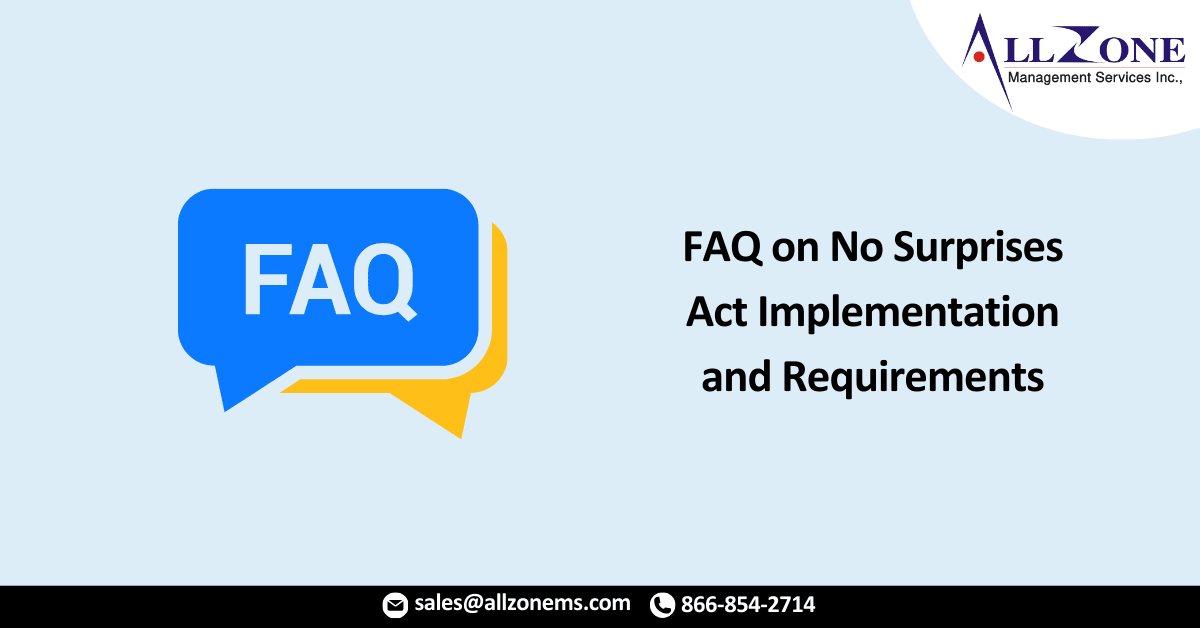CMS Releases FAQ for No Surprises Act Implementation, Requirements
The No Surprises Act FAQ states that balance billing protections do not apply to individuals with public healthcare coverage and notice and consent forms must be provided and received in written format.
June 28, 2022 – CMS has released Frequently Asked Questions (FAQs) on the No Surprises Act implementation, providing details about balance billing and notice and consent prohibitions.
The No Surprises Act prohibits nonparticipating providers and emergency facilities from billing patients for more than their applicable cost-sharing amounts for certain services, also known as balance billing.
The prohibitions on balance billing and cost-sharing protections vary among providers depending on the type of services they furnish and their practice settings.
For example, nonparticipating providers and nonparticipating emergency facilities are prohibited from balance billing and must comply with cost-sharing limitations if they furnish emergency services for a medical condition relating to a visit to a hospital’s emergency department or an independent freestanding emergency department.
When furnishing nonemergency services, nonparticipating providers must comply with the restrictions when the services are provided as a part of a patient’s visit to an in-network hospital, hospital outpatient department, or ambulatory surgical center.
Similarly, providers who furnish services related to a visit at a freestanding or hospital emergency department, hospital, hospital outpatient department, critical access hospital, or ambulatory surgical center, must comply with disclosure requirements regarding protections against balance billing and out-of-network cost-sharing.
Nonparticipating air ambulance services providers who furnish services to individuals enrolled in group health plans or group or individual health insurance coverage must comply with balance billing restrictions and cost-sharing limitations, the FAQ stated.
Additionally, the balance billing protections under the No Surprises Act do not apply to providers or facilities furnishing care to individuals with public health insurance coverage, including Medicare, Medicare Advantage, Medicaid, Medicaid managed care plans, Veterans Affairs Health Care, the Indian Health Service, and TRICARE, CMS noted.
The FAQ also shared information about notice and consent policies for No Surprises Act requirements. Providers and facilities can hold patients liable for more than the applicable cost-sharing amount for a service if they provide notice and receive consent from the individual to waive the protections.
However, providers and facilities cannot attempt to use a notice and consent form for emergency services, air ambulance services, or certain nonemergency ancillary services, including services related to emergency medicine, anesthesiology, pathology, radiology, and neonatology furnished by a physician or non-physician practitioner.
In addition, notice and consent is not allowed for services provided by assistant surgeons, hospitalists, and intensivists; diagnostic services such as radiology and lab services; services furnished by a nonparticipating provider when no participating provider is available; and services provided due to unforeseen urgent medical needs.
Providers and facilities must provide notice and seek the individual’s written consent to waive balance billing and cost-sharing protections, the FAQ clarified. Providers and facilities must deliver the notice in writing, obtain written signed consent, and provide a copy of the signed notice and consent form to the individual. Providers and facilities cannot rely on oral consent, including consent over the phone.
CMS noted that either a nonparticipating provider or a facility acting on behalf of the provider can provide notice and obtain consent from an individual. If a facility obtains the consent, it must retain the written notice and consent for at least seven years. If a provider accepts the consent, the provider must either coordinate with the facility to have it retain the notice and consent for seven years or retain it for seven years.
Finally, the FAQ stated that providers or facilities cannot seek consent from an individual to waive the No Surprises Act protections at the time care is to be furnished. If the services are scheduled at least 72 hours in advance, the notice and consent form must be provided to the individual at least 72 hours beforehand.
If the services are scheduled less than 72 hours in advance, individuals must receive the notice and consent form no later than three hours before the service.
For More Information: cms releases faq for no surprises act implementation requirements

